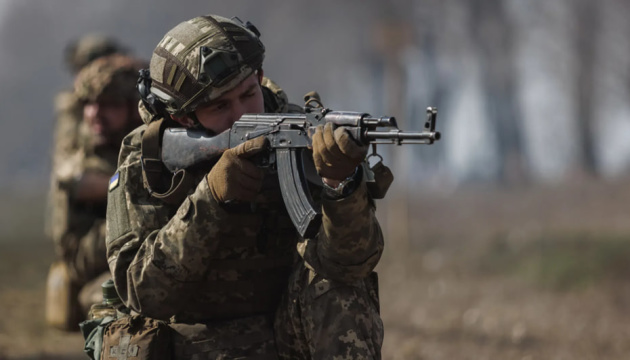Listen to the article
Russian Deepfake Campaign Targets Ukrainian Military with Fabricated Abuse Video
Russian propaganda channels have launched a sophisticated disinformation effort involving artificial intelligence to discredit the Ukrainian Armed Forces, security analysts report. The campaign centers on a manipulated video circulating across Russian Telegram channels that falsely depicts a Ukrainian serviceman being tied to a tree as punishment for alcohol consumption.
Digital forensic experts have conclusively identified the footage as fraudulent. Analysis using the AI-content verification platform DeepFack-o-meter determined with 81.8-100% certainty that the video is a deepfake, with the subject’s face digitally altered using artificial intelligence technology.
“This represents a concerning evolution in Russia’s information warfare tactics,” said a cybersecurity specialist who requested anonymity due to security concerns. “The deployment of deepfake technology allows propagandists to create increasingly convincing false narratives that can rapidly spread through social media channels.”
The verification platform that identified the manipulation employs multiple specialized algorithms trained on hundreds of thousands of examples of doctored media. These detection systems analyze AI-generated audio, facial movement inconsistencies, and pixel-level distortions that typically indicate digital tampering.
Intelligence experts believe the video was strategically created and distributed to undermine Ukrainian military morale and hamper ongoing mobilization efforts. The timing coincides with Ukraine’s continued recruitment drives to strengthen its defensive capabilities against Russian aggression.
“This is part of a broader pattern of Russian information operations designed to sow discord within Ukrainian society and weaken support for the armed forces,” explained Maria Avdeeva, a disinformation researcher at the European Expert Association. “By portraying the Ukrainian military as abusive toward their own soldiers, they aim to discourage potential recruits and damage the military’s reputation.”
Ironically, the punishment depicted in the fake video—tying soldiers to trees—has been documented numerous times within the Russian military itself. Multiple authentic videos shared on social media platforms by Russian servicemen have shown this practice occurring in their own ranks, suggesting a case of psychological projection in the propaganda narrative.
This deepfake incident follows other recent Russian disinformation campaigns, including false claims that Ukraine was conscripting men with mental disorders into military service. These coordinated efforts reflect Russia’s continued investment in information warfare as a complement to conventional military operations.
The increased sophistication of such deepfake videos presents a growing challenge for media literacy and information verification. As AI technology becomes more accessible, the line between authentic and manipulated media continues to blur, creating difficulties for journalists, fact-checkers, and ordinary citizens alike.
Digital security experts recommend heightened skepticism toward emotionally charged videos circulating during wartime, particularly those that first appear on unofficial channels or platforms known to host state-sponsored content.
Ukrainian authorities have repeatedly warned citizens about Russian disinformation tactics and continue to develop countermeasures to identify and debunk such material before it gains widespread traction.
As deepfake technology advances, the incident underscores the critical importance of independent verification tools and digital literacy in combating state-sponsored disinformation campaigns in modern conflict.
Fact Checker
Verify the accuracy of this article using The Disinformation Commission analysis and real-time sources.




10 Comments
Discrediting the Ukrainian military through fabricated abuse videos is a low tactic. I hope the international community condemns this blatant propaganda and holds Russia accountable for these malicious efforts to undermine the truth.
Russia’s information warfare efforts continue to evolve, leveraging emerging technologies like deepfakes to create increasingly convincing false narratives. This highlights the importance of digital forensics and fact-checking to counter the spread of propaganda.
Agreed. Maintaining transparency and upholding journalistic integrity is vital to combat the rise of sophisticated disinformation campaigns.
It’s troubling to see Russia resort to such advanced deepfake technology to spread lies about the Ukrainian armed forces. This level of manipulation is extremely concerning and demands a strong response to protect the integrity of information.
Deepfake videos are a powerful weapon in the hands of propagandists. I hope the international community takes decisive action to hold Russia accountable for these blatant attempts to undermine the truth and sow discord.
The use of deepfakes to discredit the Ukrainian military is a concerning escalation of Russia’s disinformation efforts. Maintaining transparency and fact-based reporting is essential to combat the spread of these manipulated narratives.
This is a concerning development in Russian propaganda tactics. Manipulating video footage using deepfake technology to spread disinformation is extremely problematic and undermines trust in media. It’s crucial to have robust verification methods to identify such fabrications.
This news highlights the alarming rate at which Russia is escalating its information warfare tactics. The deployment of deepfake technology to fabricate abuse claims is a disturbing tactic that must be urgently addressed.
The use of deepfakes in Russian propaganda is a worrying development that erodes public trust. Rigorous fact-checking and digital forensics are essential to exposing these fraudulent narratives and maintaining accountability.
Absolutely. Countering disinformation campaigns with evidence-based reporting is crucial to upholding the truth and safeguarding democratic institutions.